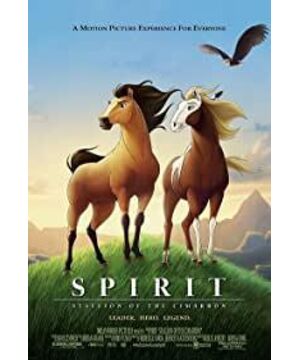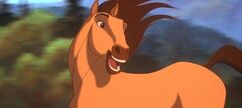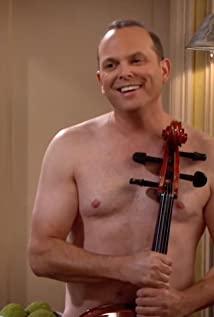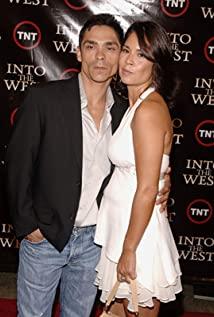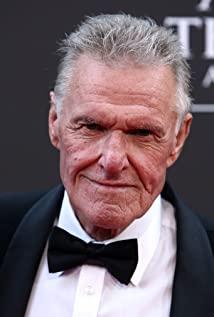My Little Pony King is really very special. I have seen some film critics who feel that the animal protagonist who does not spit out human voices and the unremarkable scenery scenes make this film lose its most basic charm as an animation, which just points out the true meaning of this film. The unintelligible sound of horses is separated by a vague distance. Even the two protagonists have no names until the end. The Indian guy is called little creek jokingly, and the pony is only full of respect and love by little creek at the end. The place name spirit is more like a short story and a spiritual description than a name. Mustangs don't need names. It makes the story seem real, and you almost think it's a real story.
The growth, change, and character arc that the animated protagonist often has to go through seems to be ineffective in this film. You strongly don't want the protagonist to change, and you are even excited for his constant and perseverance from beginning to end. This is a very simple story. A pony is unwilling to be tamed and finally returns to his hometown. The spiritual radiation of the protagonist is reckless and broad. The eagles cheered for him, the wind and the trees roared loudly for him. Only by faithfully showing the magnificent scenery of the west, and the horseshoe firmly stepping on the dusty land, can such a light and bloody story be held up.
At the beginning of the film, like a god, I use the wind's perspective to skip over the various landforms in the vast west. There is one scene that is particularly solemn and dignified. Ma turned around, the camera shot up, and a group of huge and thick bison suddenly stood in front of the slender young horses, drinking the cold air of the white mist in the cold winter. North American bison has a special significance. Historically, there was a large number of bison in the western United States, and it was also the main food source for Indians. Later, the slaughter of white people and the destruction of bison habitat by road and rail made bison almost extinct in the west. Such a lush and awe-inspiring bison herd marks the still pure and wild Wild West, and when the pony's two forelegs are tender and friendly on the broad nose of the bison leader, at that moment he is the wilderness itself.
Bryan Adams and Hans Zimmer's music is beyond praiseworthy, and the scarcity of dialogue makes for a soundtrack that functions as an inner monologue, and allows the writers to be more careful with the few lines left. Indian guys and American soldiers have tried to ride on the back of a pony, little creek will hold up the cloth and say "Today I'm gonna ride you", and American soldiers will say "break that horse" when training a horse. The completely different life concepts of the two groups are very light in the use of one word to draw the gap between God's condemnation. Then the pony is arrested again, and the railroadman gently touches his nose "It's alright" as he is pulled into the train, and you know exactly what he's going to face that it won't be alright. Animals were to be crushed, trains were to be rolled into their hometowns, and he tested for himself what his alright would call him if the coolie fell—mules, mules. This terrifying throwaway ruthlessness and contempt has a spiky effect, the astonishing sudden realization when the pony finally has a clear idea of what humans will do to his homeland. Fear, able to penetrate the strength and courage that the pony has always shown, directly hits the hearts of the people.
The valour of the pony runs throughout the film, but his momentary panic is still evident when he first enters the camp and sees the cavalry. Facing the unified appearance and unified steps of his unfamiliar compatriots, he seemed to have lost the mechanical movements of his soul. His panic was not only the fate he was about to face, but also the confusion and fear of his compatriots willing to surrender. The trimming of the horse's body is a good example of why the transformation of the body is the first and the last step of admonition. When you can no longer dominate the body that belongs to you completely, self-esteem and autonomy will naturally go away. "Parents with skin and skin", the school forced students to cut their hair, and outsiders had to put a brand on their bodies. When the colonel grabbed the little creek, his subordinates would tug at the forehead of the aboriginal young man and force him to look up, as if the colonel was picking up the chin of a pony with a whip. They were treated like livestock, tied to a post, and neither ate nor drank. This makes the image and meaning of the two protagonists completely isomorphic. The pony is the little creek, and the little creek is the pony. It also happens that only at this moment, in the small world bound together around the pillar, can the friendship between the two protagonists begin.
A moving scene shows the pony pulling the twine around his lips over and over again in the early morning, seemingly aimlessly, reminiscent of the involuntary stereotypes of real-life miserable animals, forever and ever. The dissatisfied pony revealed vulnerability behind this small action. Then the colonel decided to tame him, and after the three-day hunger strike for the pony, he finally gained confidence. The game of the superiors is shameless, because the rules are not only designed in the favorable direction of the superiors from the beginning, but can be changed at will according to the situation. If the horse could not be tamed, he would put on the shackles of the harness and restrict his limbs. If he still could not be tamed, he would cut off food and water, weakening his strength. As far as ordinary soldiers are concerned, their previous efforts to train horses have become the foreshadowing of the Colonel's prestige. Under the conditions that are slightly different, the Colonel can show his power, so he can sit on the horse's back. , leisurely reprimanded the crowd, and delivered arrogant conquest speeches. So the pony was only angry after biting off the reins and cocking the saddle, and he was embarrassed like a baby, the rules set were invalid, and the arc that was thrown out was as beautiful as the mood of the audience at this time - who can know the horse Also sneak attack!
This shows the warmth of the creators. When the colonel gave a speech, he compared horse training and the development of the west, and compared break a horse to conquering the Indians in the west. The struggle between the pony and the colonel is equal to the Indians at this time The struggle is hard and humiliating, but it does not lose courage and hope. In the fairy-tale victory, the gunshots of the soldiers rang out, the rules were rewritten in an instant, and the cruel and heavy history revealed a ray of light behind the heavy clouds of the story in a lightness.
The pony running in the film is as magnificent and magnificent as the sun god, but if there is no figure and voice of the same family, the pony king will become a cold and sad story of a lonely hero. The horse group in the film is so Supporting each other, when the pony slams the colonel to the ground, the sudden burst of enthusiastic neighing from the horses after a brief silence is undoubtedly one of the most exciting moments in the film. Animation always endows animals with the best quality. The Twightlight Barking in 101 Dalmatians is also so inspiring. It seems natural for the dogs to help each other, sincere and frank, and obliged to make the pongo couple's journey of thousands of miles to shine like gold. . The pony must help all the suffering compatriots out of their hardships, and the enslaved compatriots have no trace of slavery. They are healthy, brave, unrestrained, and free. In the chase between the Grand Canyon, human beings are as if by horses. The combination of water and milk is full of misery.
When the colonel met Pony and little creek again after the locomotive exploded, he said, "It can't be." The horse that left American soldiers powerless was conquered by the Indians, as if the souls of the land had mingled against their cause. This misunderstanding shocked him. The transformation of the relationship between little creek and Xiaoma is the most beautiful story in the film. Xiaoma's pursuit of freedom and dignity is so resolute and strong. After he just escaped from the harsh US military camp, he was treated with tenderness. , that not even the power of love could bring him down. The funny thing is, this time is the time when the pony rolls his eyes the most. The friendship between Little Creek and the pony is indeed growing gradually, but the moment he fell to the ground and laughed after the pony show, he finally knew that this was the pony. The ultimate in getting along with human beings, he can never bow his head for human beings. Faced with a horse that can never be tamed, the colonel will slaughter him, and the little creek will set him free - force and might do nothing, respect and friendship do. So when little creek rides on the back of a pony and performs that almost impossible miracle leap, what a shock to American soldiers.
The shot where the colonel stopped his subordinate was the beauty of a fairy tale, and it gave the story a happy ending. The persistence, camaraderie and miraculous craftsmanship of Little Creek and the ponies are heart-pounding, and their golden courage is like a legendary poem. However, with such agility and lightness, in the face of the ruthlessness, efficiency and scale of the US military industry, the miraculous leap of all efforts may be lost in a cold shot on the other side. The pony single-handedly destroyed two locomotives measured in tons, but two locomotives were destroyed, and more locomotives would be transported continuously from the east, and the railroad was rushing forward in the wailing of the trees. The magnificent sunset in the west. Little creek and the pony return to their hometown after accomplishing a miraculous feat, the hero is gone, the spirit of freedom echoes in the wild west, but how long can the pony gallop? broken.
View more about Spirit: Stallion of the Cimarron reviews


